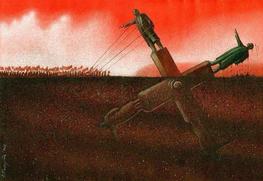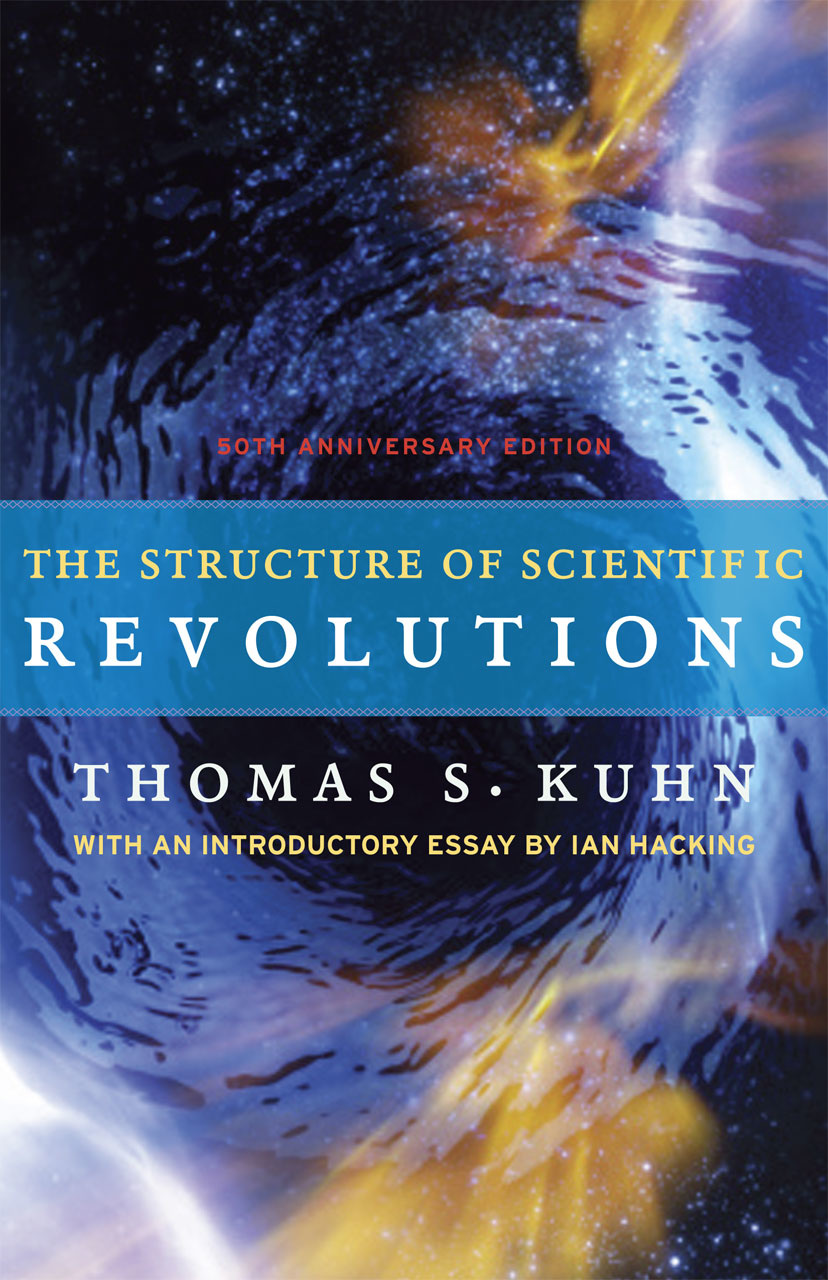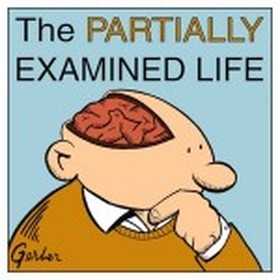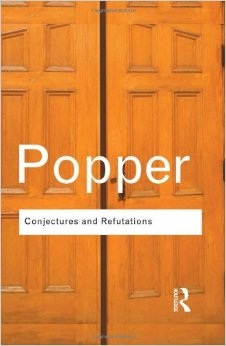|
A perfect follow-up to yesterday's resource suggestion is a very short blog post concerning "limited government" and the impossibility of such a thing. There are some Fundamental Flaws in the concept of limited government. While this article doesn't fully explore these issues and their ramifications, It piggy-backs nicely on yesterday's post and begins a discussion which can only lead to one of two places: willful ignorance or anarchy.
0 Comments
In my resource suggestions (and work in general), I try to avoid chasing whatever is topical that day or week. Instead, I try to focus on central and unmovable philosophical foundations. But this Pope visit is somewhat important. Addressing congress personally (while demeaning to the position of the pope, it is a thing that happens), Francis opted to ignore the murder-machine fueled by theft that is the United States' Government and talk about global warming in a naive and uninformed manner. Instead of calling for conversion away from the culture of death and subjugation, he called fore more death and more subjugation in the name of protecting a rock floating in space. I recommend that anyone, before uncritically gulping down the pope's rhetoric, one ought to educate themselves with regards to the material he addresses. In line with that recommendation, I provide you with a short exhortation to learn economics before assuming "global warming is a thing and it's all capitalism's fault," as Francis claims. I also have here a super-brief and very simple explanation of the basics, which Francis sees to have missed out on somehow. This issue is very, very important. The Church has withstood the test of time due to two factors: willingness to admit fault when caught teaching or acting outside of accordance with the truth, and assuredness in Doctrinal Truth. When people confuse different classes of assertion (Doctrinal Truth vs. practical consideration), they tend to discover the Church's spotty track record with regards to practical considerations (RE: Catholic social teaching) and throw out all of Doctrine due to a category mistake.
The Pope, in preaching empirically false and logically impossible teachings, is likely to attract lukewarm converts who are radically divorced from reality while chasing away rational and virtuous Catholics, especially when both the pope and those receiving his message fall into the category mistake of believing everything the Pope says, instead of critically assessing his teachings and discerning between Doctrine and practical consideration. The time has come, I think, to purge some podcasts off my list. I have more podcasts than I have time, and some of them have ceased providing utility for my current situation... which happens a few times a year. Usually, when this time comes, I share on facebook the ones that I am abandoning and why. Now that I have a platform on which I talk about podcasts incessantly, I figure this may be a better place to do so.
Podcasts I continue to listen to (in order of priority):
Podcasts I no longer listen to:
Podcasts that have been discontinued:
Today's resource suggestion is a simple logic test and the explanation concerning the results of that test. "How Logical Are You?" is a short, simple video that explains what amounts to one of the foundations of Bertrand Russel's logic works. These sorts of puzzles ought to be commonly known to people at large as, without them, illogical assumptions and prejudices become the cultural narrative. I'm speaking less about racism and more about the inevitable rise of criminal and misanthropic institutions.
You can find the video here, on YouTube. I got it right. I say this not to brag, but to prove that there is no excuse for not getting it right, if my dumb ass can. If you don't get it right, that's fine; you can learn (with time and effort) how to think logically, too.
The rules to the puzzle may not be very clearly stated. The cards have two sides. The rules concerning "if one side is X, the other side is Y" refers to individual cards, not the set. If you want a clue, I recommend hearkening back to what Karl Popper thinks about knowledge and how one increases certainty..
Also, while it sounds like the video poo-poos inductive reasoning, if you watch it all the way through, they clearly show the utility of induction, even if it isn't logic, per-se. I've previously recommended reading Karl Popper's Conjectures and Refutations, as I feel Popper has provided the best set of epistemological tools and groundings for science to-date. Thomas S. Kuhn is often trotted out as a more modern counterpoint to Popper, especially in his work in The Structure of Scientific Revolutions. You can get the .pdf for free here, but I bought the book so I could write in the margins. If anyone is familiar with Popper, Kuhn, and my own dabbling in epistemology, they will notice that the other two have influenced my epistemology dramatically. Where many set up an opposition between Popper and Kuhn, I believe that antagonism (at least, in the realm of ideas and logic) is unwarranted. Popper was engaged in a Bertrand-Russel-esque project of trying to use the tools of logic and reason to ground the functional applications of that logic in a manner consistent with the logicians' project.
Kuhn, on the other hand, is making an observation of the normative manner in which science is done. Wielding the tools forged by Wittgenstein in the realms of language and cultural phenomena, Kuhn indirectly draws parallels between the manner in which science is actually done and the language games played in Wittgenstein's ontology. Because of this difference in focus and approach, what results is Popper's "This is the epistemic grounding for the scientific exercise and methods" is set in opposition to Kuhn's "But this is what scientists are actually doing." In reality, there can be a reasonable synthesis betwixt the two. Popper, early on in Conjectures and Refutations, describes the different ontologies of the scientific method: essentialism/realism, instrumentalism, and what he calls "conjectures" but I like to call falsification (or, induction by falsifiability). Popper makes a compelling case for falsification as the most cogent ontology of science. Kuhn is, by his own admission, a staunch instrumentalist. This instrumentalism is a matter of normativity. In the case of the indirectly observable (particle physics, quantum mechanics, evolutionary and global climate sciences, etc.) Popper's defense of falsification and attack on instrumentalism begins to falter, but not fail. Because instrumentalism has shown to get more quantifiable and marketable results (more journals published, more TV shows by Neil De Grasse Tyson, and more government grants), it has become the cultural MO for quite some time in the scientific community. Kuhn explores the sociology and phenomena of scientific communities and the nature of change between different theories and methods of doing science. Insofar as he is making normative claims, he does an excellent job of showing how things are done. I feel that he fails in making claims as to how science should actually be done, essentially taking the normative case and saying that "it isn't fully developed yet, we ought to continue along this instrumentalist and diversified method of theory-making." without making a compelling case as to why that is the appropriate course of action. This book, along with Poppers, is crucial to understanding the rationale and culture behind the claims made by physicists and philosophers of science today, especially when dealing with the limit-sciences of thins like quantum physics. As a work of literature, it is a bit rough to read. Where Popper takes 600-ish pages to explicate and defend 600 pages worth of material in a readable and concise manner, Kuhn takes 200-ish pages to explicate one central concept that could be done in less than 50 pages, applying the same rubric to multiple cases, over and over, in a manner that could be done more directly without losing any substance or rhetorical power. There are more than one chapter in my unpublished book dedicated to epistemology and the synthesis between Popper and Kuhn, which have already strongly influenced certain blog posts, such as the post on Paradigmatic Awareness, in case one wants to explore related concepts before devoting time and money to reading the primary source.
An oldie, but goodie. In this one, Cantwell takes apart an argument provided by a self-proclaimed atheist who is anything but. Cantwell *is* an atheist, while I am most certainly not, I can appreciate the integrity of his position and the fact that he manages to come around to the Truth in so many things. Had he been raised by decent Catholics, he may not have had so strong an aversion to the philosophy which so closely parallels his own.
Anyway, Cantwell disassembles his arguments with dramatic flourish. Some responses he provides are less compelling than others, but those that claim to be atheist or those that believe that paying your taxes, calling your senator, and voting is compatible with Christianity ought to watch this video. I wrote a post about paradigmatic awareness a while back. I wrote it while editing a couple chapters in my book. Those chapters were concerned with epistemic rigor and the manner in which one can rightly approximate knowledge using experience, logic, and thresholds of doubt. I believe such things to be more important than nearly any other human faculty. Because my book is not yet completed or published, I will share someone else's work which is similar, if not quite as deliberate, to those chapters. The Voluntary Life Podcast has a three episode series titled "How to Think for Yourself": Part 1 is concerned with why methods of reason are important to rational creatures and begins to address the difficulties in establishing a method of reason. Part 2 is concerned with a brief overview of the scientific method, philosophy of science, and their relationship to epistemology. Most important, it explains the requirements for epistemic confidence. Part 3 is concerned with a priori reasoning and the relationship between reason and freedom. It's encouraging to see someone else produce work that is so similar to my own, in that it makes me feel a little less crazy. The differences between the two are also encouraging, as it makes me feel I have something to contribute to the conversation. I am considering different distribution methods for my book. Feel free to read more about it here.
The first podcast I ever downloaded, The Partially Examined Life, is a perennial staple of my podcast-listening and self-education. Their Zero Episode does a great job of introducing their project. I have gotten the most out of their podcast by reading the material ahead of time, listening to the podcast, and then talking to someone (anyone) about the material discussed and trying to tease any kind of intellectual response out of them. Previous attendees of my mostly-defunct philosophy club will recognize several of these episodes and ideas. I understand several of the earlier episodes (my favorite ones) are behind a paywall these days, but people have to make a living, right? They're up on iTunes and all the other podcast aggregators. My favorite episode is probably their 100th episode... however, their commentaries on Camus, MacIntyre, Antigone, etc. are amazing. I recommend starting at the beginning and moving on from there, as they do build on past episodes in order to be able to address higher-level and more esoteric concepts later on.
Today's resource suggestion is a little more involved than previous ones. Today's resource suggestion is Karl Popper's Conjectures and Refutations. This book primarily concerns itself with the problem of doing science from an epistemic standpoint. This may not seem to be too important to the project I have been engaged in with this blog, but to anyone who reads the book, you will likely see the connection very quickly. My post on Paradigmatic Awareness is, essentially, a synthesis of this work and another by Thomas S Kuhn, which will likely be another resource suggestion soon enough.
While Popper was primarily interested in the philosophy of science in this book, I believe his insights apply to all of epistemology, not just the study of the material world. As a classical liberal, Popper extends his epistemic reasoning out to his own version of social contract theory. I think that, while he had a good basis to work off of and an amazing intellect, he made the mistake that many classical liberals made: he forgot that the institutions he advocated for would never go away; where tolerance, as he imagined it, was only supposed to be implemented so long as it was practically useful to collective flourishing, it has become the monster that it is today... inspired by his own words. So, please read Conjectures and Refutations. It will help broaden your understanding of how one can say that they know what they know, how science as an exercise ought to be done, and reveal a great deal of the social philosophy that has gotten the western world into the trouble that it is in now. http://www.amazon.com/Conjectures-Refutations-Scientific-Knowledge-Routledge/dp/0415285941 "My thesis is that the criteria by which individuals are deemed qualified or unqualified to become professionals involve not just technical knowledge as is generally assumed, but also attitude—in particular, attitude toward working within an assigned political and ideological framework. I contend, for example, that all tests of technical knowledge, such as the Graduate Record Examinations (GRE) or the Law School Admission Test (LSAT), are at the same time tests of attitude and that the examinations used to assess professional qualification are no exception. I consider in detail how the neutral-looking technical questions on such examinations probe the candidate's attitude. Another School Sucks Podcast on my resource list. Expect to see more in the future, too, this is a very valuable resource. This discussion sounds essentially like a discussion of how to use NVC in debates. I am still skeptical as to whether NVC has any value in text-only conversations like those on facebook, but they make a decent case for giving it a shot.
They also discuss the nature of popular debates, and how they are all discussions of statist policy, even when they are billed as scientific debates. And there's a good chunk of discussion concerning some very good self-help tools at the end. |
Archives
October 2015
Categories
All
|







 RSS Feed
RSS Feed
